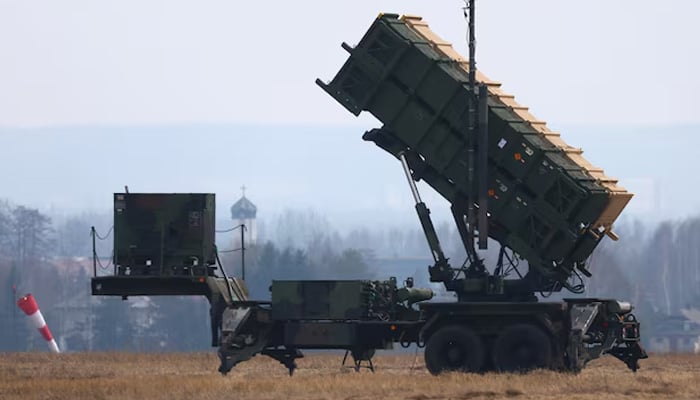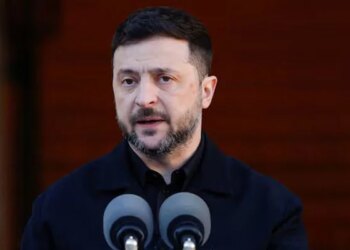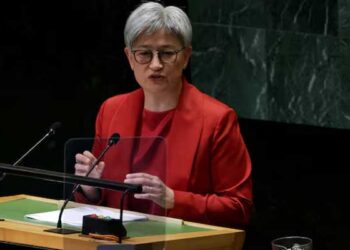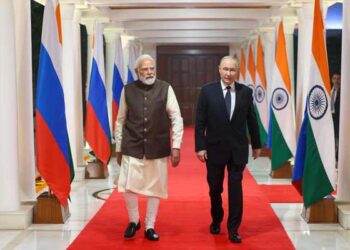Select Language:
- Trump warns of potential secondary sanctions on Russia in 50 days.
- Up to 17 Patriot missile batteries may be available ‘very soon.’
- Russian stock markets react positively, indicating relief over the delay.
On Monday, US President Donald Trump unveiled new arms supplies for Ukraine and threatened to impose sanctions on buyers of Russian exports unless Moscow agrees to a peace agreement within 50 days. This marks a significant shift in policy driven by frustration with Russia.
In the Oval Office alongside NATO Secretary General Mark Rutte, Trump expressed disappointment in Russian President Vladimir Putin, stating that billions in weaponry would be provided to Ukraine.
“We’re going to supply advanced weapons to NATO,” Trump mentioned, adding that America’s NATO allies would cover the costs of these arms.
Included in this arsenal are Patriot air defense missiles, which Ukraine urgently needs to shield its cities from Russian aerial strikes.
“It’s a complete package with the necessary batteries,” Trump confirmed. “We expect some to arrive very soon, within days… several countries that have Patriots will be making exchanges.”
He noted that some or all of the 17 Patriot batteries ordered by other nations could be sent to Ukraine “very quickly”.
Trump’s threat of secondary sanctions on Russia would represent a considerable change in Western sanctions policy if implemented.
Legislators from both parties in the US are advocating for a bill to permit such actions, targeting other nations purchasing Russian oil.
For over three years of conflict, Western nations have severed most of their financial relationships with Moscow, yet have refrained from restricting Russia’s oil sales to other markets. This has permitted Russia to earn substantial revenue from oil exports to countries like China and India.
“We will impose secondary tariffs,” Trump stated. “If no deal is reached in 50 days, it’s straightforward, and they’ll be set at 100%.”
A White House representative clarified that Trump was referring to 100% tariffs on Russian goods and additional sanctions on other nations purchasing these exports.
Grace Period
Despite this, Trump’s announcement of a 50-day grace period was met with relief from investors in Russia, with the ruble recovering from previous losses and stock markets climbing.
“Trump’s performance fell short of market expectations. He offered 50 days for the Russian leadership to devise a response and potentially prolong negotiations. Moreover, he is known for pushing back deadlines,” remarked analyst Artyom Nikolayev from Invest Era, a financial insights firm.
Returning to power this year with promises for a swift resolution to the conflict, Trump indicated that his change in tone stems from increasing dissatisfaction with Putin, who has spoken of peace while continuing to bombard Ukrainian cities.
“We had what could have been four separate deals. But each time, they fell through because of bombings that occurred that night, leading us to abandon the negotiations,” Trump said.
Since resuming his presidency, Trump has sought to mend relations with Moscow, engaging in multiple discussions with Putin.
His administration has scaled back support for Ukraine’s NATO ambitions and softened demands for a full Russian withdrawal from Ukrainian terrain.
So far, however, Putin has not accepted Trump’s proposal for an unconditional ceasefire, which Ukraine quickly supported. In recent days, Russia has continued to use drones to attack Ukrainian urban areas.
Last week, Trump expressed his frustrations, saying, “We’ve been subjected to a lot of nonsense from Putin.”
Earlier Monday, Ukrainian President Volodymyr Zelenskyy had a meeting with Trump’s representative Keith Kellogg.
Zelenskyy indicated they discussed “the path to peace and practical steps we can take together to hasten it,” including “bolstering Ukraine’s air defenses and collaborative military production with European partners.”
Shortly after their discussion, Kyiv declared an air raid alert.
Separately on the same day, Zelenskyy announced the replacement of Prime Minister Denys Shmyhal with his first deputy, Yulia Svyrydenko, as part of a “transformation of the executive branch.” Her appointment requires parliamentary approval.
At 39, Svyrydenko is an economist and has previously served as the Minister of Economic Development and as Deputy Head of Zelenskyy’s office, playing a crucial role in negotiations between Kyiv and Washington regarding a mineral trade deal.
Since launching a full-scale invasion in February 2022, Russia has captured approximately a fifth of Ukraine. Its troops are slowly advancing in eastern Ukraine, with no indication that Moscow plans to abandon its primary war objectives.







